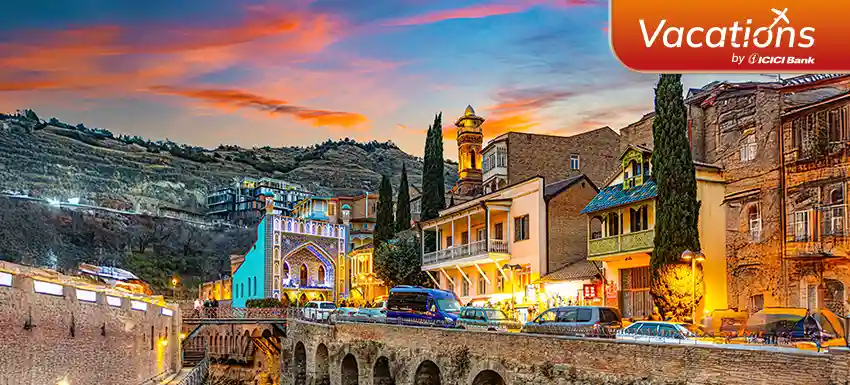THE
ORANGE
HUB
Georgia Travel Magazine

Theme of the month: Bridging Two Worlds
September is a season of in-betweens — where the warmth of summer still lingers in the afternoons, yet autumn’s crisp promise begins to whisper through the vineyards and valleys. In the southern hemisphere, the bridge is reversed, moving from winter’s stillness towards spring’s awakening — but it is a bridge month, nonetheless.
In this issue, we celebrate bridges: not just the physical kind, but the ones that connect seasons, cultures and eras. Georgia itself is a living bridge — a meeting place of Europe and Asia, where Orthodox Cathedrals rise beside ancient pagan sites, where the lyrical strains of Persian poetry meet the austere echoes of Soviet history.
For travellers, September in Georgia is a golden window. The summer crowds have thinned, yet the air is still warm enough for the Black Sea’s embrace. In the mountains, crisp mornings invite treks through trails painted in early autumn hues. Across the countryside, the Rtveli harvest festival fills villages with music, dance and the scent of freshly crushed grapes. Markets overflow with figs, grapes and walnuts — each bite carrying the memory of a centuries-old cultivation heritage.
In this issue, we invite you to see travel as a bridge-building act — between the outer world you explore and the inner world you carry home.
Soul Trip: The Art of Arriving

Too often, we treat arrival as a line crossed on an itinerary: we land, we check-in, we go see things. But in Georgia, arrival is an unfolding — a slow sip of amber wine, the way locals draw you into conversation as if you’ve known each other forever, the moment your eyes adjust to the gentle chaos of Tbilisi’s balconies and winding lanes. Soul travel here means letting yourself arrive again and again — at each village, each mountain pass, each shared table. You may notice that Georgia resists rushing. Supra, the traditional feast, is a lesson in slowness; it can last for hours, punctuated by toasts that open like petals, revealing deeper truths. The landscape too teaches patience; the Caucasus Mountains don’t reveal themselves all at once, but layer by layer, like a story passed down through generations. If you let it, Georgia will remind you that arriving is not a single moment. It’s a practice — a way of greeting each experience as if it were the very reason you came.
Destination Focus: Georgia - Crossroads of History

Georgia is often described as Europe’s best-kept secret, yet its history spans millennia, its culture resists categorisation and its landscapes feel as though they’ve been painted from a dream. Nestled between the Greater and Lesser Caucasus Mountains, it shares borders with Russia to the north, Turkey and Armenia to the south, Azerbaijan to the southeast and the Black Sea to the west. This location has made Georgia both a meeting point and a prize — a land where trade routes, armies and cultures have intersected for thousands of years.
For over 3,000 years, Georgia has been a melting pot of influences. Ancient kingdoms here were active participants in the Silk Road trade, exchanging goods, stories and traditions with travellers from Persia, Greece, Rome and beyond. The Ottoman and Persian empires each left their mark, as did centuries under the Russian and Soviet rule. Yet through it all, Georgians fiercely protected their language — a unique linguistic island with its own script of flowing, curving letters unlike any other in the world.
The country’s spiritual identity was shaped early. Georgia adopted Christianity in the 4th century, making it one of the oldest Christian nations in the world. Its ancient monasteries, many carved into mountainsides or perched atop dramatic hilltops, stand not only as religious centres, but as sentinels of resilience.
A Landscape of Contrasts
Georgia’s geography is a kaleidoscope of contrasts. In the north, the towering peaks of the Caucasus Mountains invite trekkers and climbers with trails that pass through alpine meadows, glacial lakes and remote stone villages. In the west, subtropical breezes sweep in from the Black Sea, nurturing lush lowlands and tea plantations. The eastern plains, drier and sun-baked, are home to the famed wine region of Kakheti, where golden vineyards stretch to the horizon. In between lie rolling valleys, dense forests and semi-arid steppes — each with its own microclimate and distinct character.
September is one of the best times to experience this diversity. The summer heat softens, the mountains remain accessible and the coast still offers warm waters. The countryside hums with the energy of harvest — figs, walnuts, and above all, grapes.
Cities and Cultural Treasures
- Tbilisi – The capital is a city of layers. Its Old Town is a maze of narrow streets, crumbling balconies draped in vines, Ottoman-style sulphur baths and century-old churches. Modern Tbilisi adds art galleries, innovative restaurants and lively cafés. Above it all looms the Narikala Fortress, offering panoramic views of the city and the Mtkvari River.
- Kazbegi (Stepantsminda) – Dominated by the snow-capped peak of Mount Kazbek, this mountain town is the gateway to the Gergeti Trinity Church, perhaps Georgia’s most iconic sight. The trek to the church — framed by dramatic highland scenery — is unforgettable.
- Kakheti Wine Region – This is Georgia’s wine heartland. Family-run wineries open their doors to visitors, offering tastings of amber-hued Qvevri wines alongside hearty Georgian feasts. September is harvest time here and the atmosphere is one of celebration.
- Svaneti – A remote mountain region dotted with medieval tower houses, Svaneti is a living museum of Georgian highland culture. Mestia and Ushguli, UNESCO World Heritage sites, showcase traditions preserved over centuries.
- Mtskheta – Often called the spiritual heart of Georgia, Mtskheta is home to Svetitskhoveli Cathedral and Jvari Monastery, both UNESCO sites. These sacred places are deeply woven into the country’s religious and national identity.
To get a sample itinerary for Georgia, Click here
Kakheti – Cradle of Wine

Kakheti, Georgia’s renowned wine region, boasts of a winemaking tradition that archaeological evidence dates back to nearly 8,000 years — arguably the oldest in the world. It is here that the Qvevri was born: a large, egg-shaped clay vessel traditionally made in the village of Vardisubani. These vessels are central to the Kakhetian method, in which crushed grapes — skins, seeds and stems (Mezga) — ferment and mature underground for months. The result is a rich, amber-hued wine, often referred to as orange wine, made from native grape varieties like Rkatsiteli, Kisi, Khikhvi, and Mtsvane.
This method is so significant that UNESCO has inscribed the traditional Kakhetian Qvevri winemaking process on its list of the Intangible Cultural Heritage of Humanity. Attending Rtveli in Kakheti is not just a tourist activity — it’s an immersion into one of the most vital threads of Georgia’s cultural fabric.
Rtveli – The Grape Harvest Festival
In Georgia, wine is not merely a drink — it is a cultural cornerstone, a symbol of hospitality and a link to the past. September and early October mark Rtveli, the traditional grape harvest festival. Across the villages of Kakheti and other wine regions, families and neighbours gather to pick grapes under the golden sunlight. Visitors are often welcomed to join in — snipping bunches from the vine, stomping them barefoot in large wooden vats, and sharing in endless feasts that follow.
These feasts, called Supra, are guided by a Tamada (toastmaster) who leads the table through a series of toasts — to family, to ancestors, to peace, to love and to life itself. Between toasts, guests are treated to Georgia’s hauntingly beautiful polyphonic singing, a UNESCO-recognised tradition.
More Than Wine
While wine flows freely, Georgia’s appeal extends far beyond the vineyard. Its cuisine — an intoxicating blend of Mediterranean freshness, Middle Eastern spices and hearty mountain fare — is a highlight in itself. Dishes like khachapuri (cheese-filled bread), Khinkali (soup dumplings) and Pkhali (vegetable pâtés) reflect the same fusion of influences that define the country’s history
Adventure seekers can find world-class trekking, skiing in the winter months and paragliding over dramatic valleys. Culture lovers can explore ancient cave cities like Uplistsikhe, browse contemporary art spaces in Tbilisi or visit small village museums preserving folk crafts.
Georgia in September – A Celebration of Abundance
To visit Georgia in September is to encounter a country in full bloom of its cultural and natural abundance. It is the season when the land gives generously, when traditions open to include guests and when the weather invites exploration of both mountain trails and seaside promenades. Whether you come for the wine, the history, the landscapes or the warmth of its people, you will leave with the sense that Georgia has woven itself into your memory — and that you have become, in some small way, part of its ongoing story.
Travel Smart: Documents and Safety
Before you step onto a plane, your most valuable travel asset is not your suitcase — it is your paperwork. When travelling to international destinations, especially non-English speaking ones, having your documents in order can save you from delays, fines or worse. Here is how to travel prepared and protected:
- Passport Health Check – Make sure your passport has a validity of at least six months from your return date, plus a few blank pages for stamps
- Visa Readiness – Always confirm the latest rules through official channels before departure, specially where transits are involved
- Travel Insurance – Choose a policy that covers medical emergencies, evacuation, theft and cancellations. Keep both digital and paper copies handy
- Medical Records & Prescriptions – Carry a printed list of medications with generic names, your doctor’s contact details and any necessary medical certificates
- Multiple Backups – Scan passports, visas, insurance papers and tickets. Store them in encrypted cloud storage and on a USB drive. Keep one paper copy in your luggage
- Emergency Info Card – Write down key contacts such as local emergency numbers, your embassy and your hotel. Keep one in your wallet and another in your phone
- Money Matters – Carry a mix of cash and cards. Inform your bank of travel dates to avoid card freezes. Forex Cards are a great way to carry foreign currency
- On-the-Go Safety – Use cross-body bags or money belts in busy areas. Never keep all valuables in one place
- Local Courtesy – Respect religious site dress codes and always ask before photographing people or private property.
Travelling smart is less about paranoia and more about removing obstacles, so your focus stays on the journey — not the paperwo.
Sustainable Travel Tip of the Month: Support Local Food Systems
One of the most impactful ways to travel sustainably is through your plate. In Georgia, this means choosing family-run restaurants, visiting local markets and sampling seasonal produce. By doing so, you:
- Reduce your carbon footprint — fewer transport miles for food
- Support small-scale farmers and traditional agricultural practices
- Help preserve culinary heritage, from Khachapuri to Tkemali plum sauce.
Practical steps:
- Eat seasonal: In September, seek out fresh figs, grapes and pomegranates
- Visit markets: Tbilisi’s Dezerter Bazaar is a feast for the senses and a direct link to farmers
- Join a cooking class: Learn to make Khinkali dumplings with a local host
- Avoid chains: Opt for independent eateries over global fast-food brands.
Food is culture everywhere — every bite carries the story of a land and its people. Eating local isn’t just delicious, it is a small but powerful way to keep those stories alive. And not just in Georgia, these tips make you a better traveller anywhere you go.
‘Vacations’ is powered by OneShoe Trust for Responsible & Mindful Travels – a social enterprise that promotes travelling as a means to raise awareness about climate change and environmental issues. Incubated at IIM Bangalore, OneShoe is the source of most authentic travel experiences around the world.
Link: oneshoetravels.com
Scroll to top


